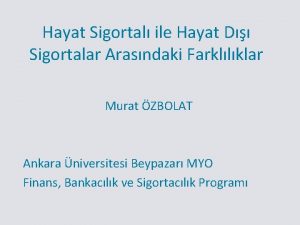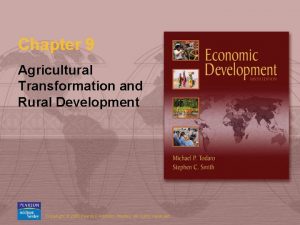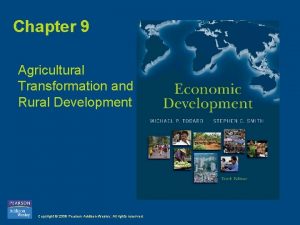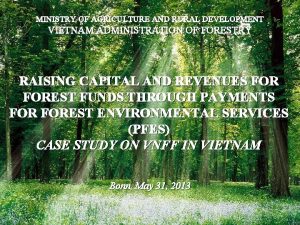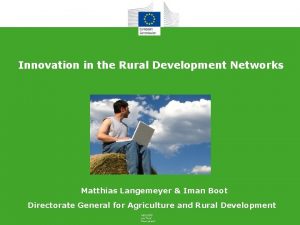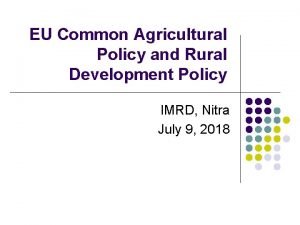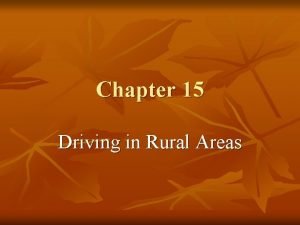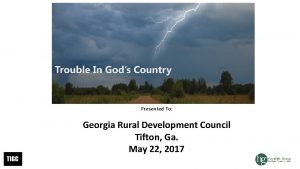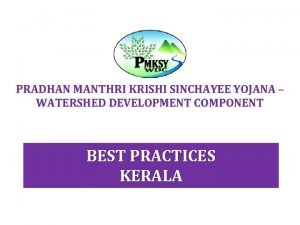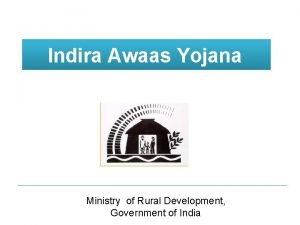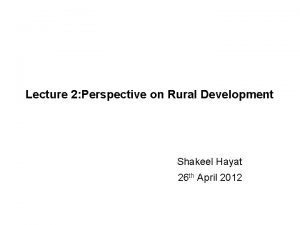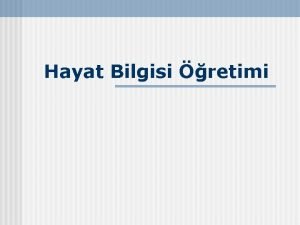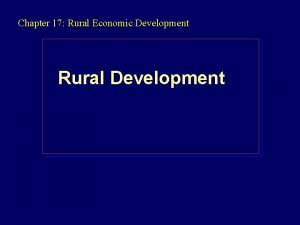Rural Development April 2012 Shakeel Hayat Shakeel imsciencesgmail












- Slides: 12

Rural Development April 2012 Shakeel Hayat Shakeel. imsciences@gmail. com 25 th

Unit Aim l To provide an interdisciplinary introduction to the background and concepts of rural development in the context of international development and to understand the main components of urban and rural livelihoods.

Unit Objectives To enhance student understandings of rural development, their drivers, processes, outcomes and implications for urban and rural policies l To provide insights to the complex linkages between rural development and rural poverty alleviation l To understand, measure and be able to assess the significance of processes of change l

Unit Linkages l The unit is a core unit for the BS (Hons) Economics. There are no pre-requisites for the unit, although students should have a reasonable understanding of essential elements of the rural developmental policies, changes and process and appreciation of linkages with social, economic and political systems

Unit Outcomes: Key Skills Developed l l l Conceptual knowledge of perspectives on rural change and development Analytical skills and critical thinking on the processes of change Understanding of underlying processes in global change and their interactions with coupled socio-ecological and socio-economic systems Essay writing, including critical thinking regarding the conceptualisation of responses to questions, research into and gathering of material, the assimilation and analysis of supportive material, and the construction of analytical and well presented pieces of work Presentation skills for seminar work, involving the ability to synthesise information into a short presentation, to present and critically debate information or ideas clearly, audibly and with visual aids as necessary, and to develop confidence in speaking to groups of people

Unit Content and Structure Week 1: Perspective on rural development • International experience with rural development • Rural development in Pakistan • Rural development planning in Pakistan • Rural poverty in Pakistan Week 2: Participatory approaches to rural development • Participatory approaches to rural development and rural poverty alleviation Week 3: Livelihood and rural development • Concepts and definition • Principles, framework and operationlization • Utilizing the framework for livelihood analysis

Unit Content and Structure Week 4: Agriculture and rural development • Rural economy • Green revolution and Land reforms • Food security and agriculture in Pakistan • Sector approaches to agriculture and rural development • Livestock and horticulture sector • Rural finance Week 5: Rural non-farm economy • Promoting rural growth and poverty reduction Week 6: Information and Communication Technologies (ICTs) and rural development • ICT as an enabler of socio-economic development • ICT for rural development

Unit Content and Structure Week 7: Urbanization in Pakistan • The urban strategy • The phenomenon of migration and the urban poverty challenge Week 8: Foundations of Urban Planning • Understanding the genesis of urban planning concepts • Exploring the development of urban planning from the colonial period • Enabling legislation and accompanying regulatory models; and ideologies of the 19 th and 20 th centuries Week 9: Urban Planning and Development Processes and functions • Planning processes i. e. politically, economically and environmentally • Basic tools of planning, including the General Plan, redevelopment, the Subdivision Map Act, and other land-use regulation techniques

Unit Content and Structure Week 10: Planning and Communications in Urban Development • Techniques for consensus-building mediation and facilitation • Contemporary themes in land use planning and variety of communication techniques Week 11: Financing Urban Development • Theories, methods, and practices of financing private and public development projects • Urban development and real estate investment • Capital markets, lenders, partnerships, joint ventures and syndications

Unit Content and Structure Week 12: Development Opportunities and Constraints • Smart growth site development and smart growth analysis • Opportunities and constraints on development Week 13: Urban Design • Issues and challenges impacting urban design for a variety of land uses • Concepts of design opportunities and site constraints • Single-family and multifamily sites; and commercial projects Week 14: Urban Planning and Development Law • Bodies of law that impact the practice of planning • The scope of land-use planning, land-use practice, and the enforcement of planning regulations • Current interpretations of law and methods of obtaining land-use approvals and permits

Modes of Assessment This unit will be assessed by two pieces of coursework or written exam, one group presentation or short assignment and one comprehensive l Each assessment will account for 20% of marks except comprehensive l Comprehensive will account for 40% of marks l

Unit Problems If you encounter problems with this unit, please: first see the course convenor directly concerned l If the problem persists, referring the matter to the Student Representative l If you feel your coursework or written exam marks are unfair and are unsatisfied with the explanation you have the right to appeal against the decision to the course convenor l If formal procedures fail to reach a satisfactory conclusion, a formal complaints procedure can be operated through the course coordinator i. e. Mr. Sikandar Khan l
 Hayat ve hayat dışı sigortalar arasındaki farklar
Hayat ve hayat dışı sigortalar arasındaki farklar Miracle of hazrat dawood
Miracle of hazrat dawood Eucaryote unicellulaire
Eucaryote unicellulaire Chapter 9 agricultural transformation and rural development
Chapter 9 agricultural transformation and rural development Chapter 9 agricultural transformation and rural development
Chapter 9 agricultural transformation and rural development Ministry of agriculture and rural development cameroon
Ministry of agriculture and rural development cameroon Ministry of agriculture and rural development vietnam
Ministry of agriculture and rural development vietnam Rural development
Rural development Rural development
Rural development Rural areas have of development drivers ed
Rural areas have of development drivers ed Usda rural development tifton ga
Usda rural development tifton ga Pradhan mantri krishi sinchayee yojana in kerala
Pradhan mantri krishi sinchayee yojana in kerala Ministry of rural development
Ministry of rural development
